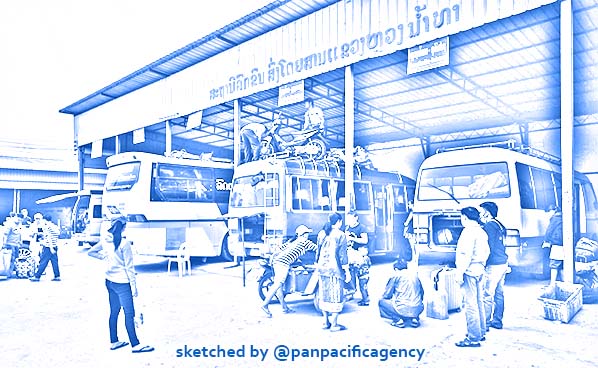Thai, Lao borders stay shut despite calls for reopening

Luang Namtha's bus station on the Laos-China border. Photo: ontrails.co. Sketched by the Pan Pacific Agency.
PHNOM PENH, Jun 24, 2020, The Khmer Times. Thailand and Laos borders will remain closed to the Kingdom. The decision comes following talks with the countries’ officials regarding the reopening of borders to stimulate trade after months of stagnation due to the pandemic, The Khmer Times reported.
In a provincial hall statement released yesterday, Banteay Meanchey provincial governor Oum Reatrey said Thai authorities remain adamant in keeping the Poipet-Khlong Luk International Checkpoint – the most important border point shared by the two nations – closed for entry, including by Cambodian vendors.
“[It] will remain closed and there is no official information to confirm whether when it will reopen,” the statement said.
However, it noted: “The Banteay Meanchey provincial governor and Thai authorities agreed in principle to allow 50 trucks, with each having no more than two people, to transport goods in and out of Rong Kluea border market.”
Despite the leeway, the statement said the market which is located in Thailand’s Sa Kaeo province will only be open to the trucks from 8am to 1pm. Moreover, drivers of the trucks must observe instructions issued by health authorities to prevent any coronavirus transmission.
Meanwhile, Cambodian migrant workers returning from Thailand can only come through the O’Bei Choan checkpoint in O’Chrov district.
The statement was released after yesterday’s meeting via video conference between Banteay Meanchey provincial governor Oum Reatrey and his Sa Kaeo counterpart, Voraphan Suwannus. The discussion was arranged following the former’s request to tackle the reopening of the Poipet-Khlong Luk International Checkpoint, which had recently been at the centre of contention.
Last month, Mr Reatrey rejected a request from the Cambodian Informal Economic Workers Association which asked for the right to stage a protest from June 1 to June 7, involving about 1,500 vendors, at the border.
“Cambodian vendors who usually sell their goods at Rong Kluea market are very concerned as they cannot access the market and a lot of their stock is perishable.”
“Their goods will not keep fresh for an extended period. Therefore, the longer they wait, the more likely it is they will not be able to sell their produce. This could have a massive financial implication for sellers,” said CIEWA chief Din Puthy at the time.
Bangkok Post in March said Thai authorities decided to temporarily close all 19 border checkpoints in Sa Kaeo province along the border with Cambodia in a bid to stem the coronavirus outbreak.
The closures led to hundreds of Cambodian migrant workers flocking back to the Kingdom. In recent weeks, some Cambodians had attempted to illegally cross into Thai territory after a long period of unemployment.
Meanwhile, Stung Treng provincial governor Mom Saroeun said yesterday that Laos has decided to keep its sole border checkpoint with Cambodia closed.
“Currently, our international checkpoint will remain closed. Laos has not decided to reopen its border checkpoint and we also haven’t received any instruction from the government to open ours,” he said.
Mr Saroeun said the import and export of goods between the two nations remain minimal amid the pandemic.
“I have been pushing my Lao counterpart in Champasak province to [reopen the border], but they remain cautious. We want to reopen the checkpoint so we could operate as normal for the benefit of the people,” he said, adding both countries should look into lifting cross-border travel bans as soon as possible while maintaining stringent safeguards.
Like Thailand, Laos in March closed its border checkpoint along the border shared with Cambodia to prevent the spread of COVID-19. Both countries only share one international checkpoint located in Stung Treng province and Laos’ Champasak province.
The Cambodian government on June 19 lifted the ban on cross-border movement via borders shared with Vietnam although it said COVID-19 prevention guidelines must remain in place.
The move came three months after Prime Minister Hun Sen declared the closure of the borders. Experts this week welcomed the decision, saying now is a “suitable time” to allow travel between the two nations and restore the economy which has suffered from the virus.
Foreign Affairs Ministry spokesman Koy Kuong said yesterday that despite the reopening, some restrictions remain, including the non-issuance of tourist visas and limiting the entry of Vietnamese nationals to businessmen, technicians and students.